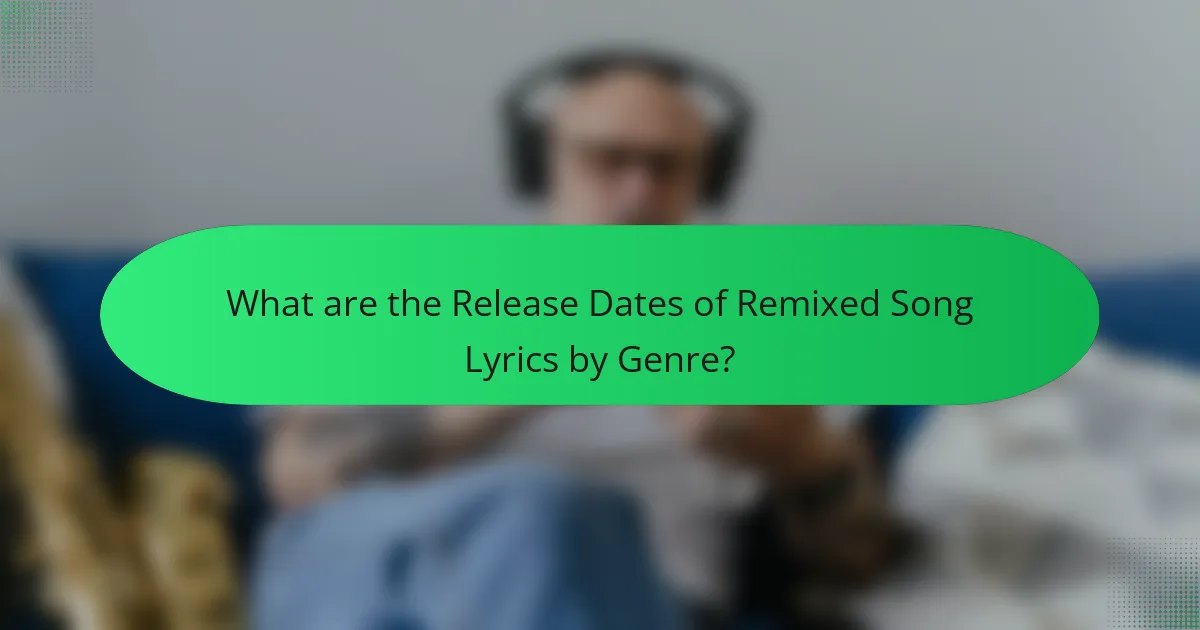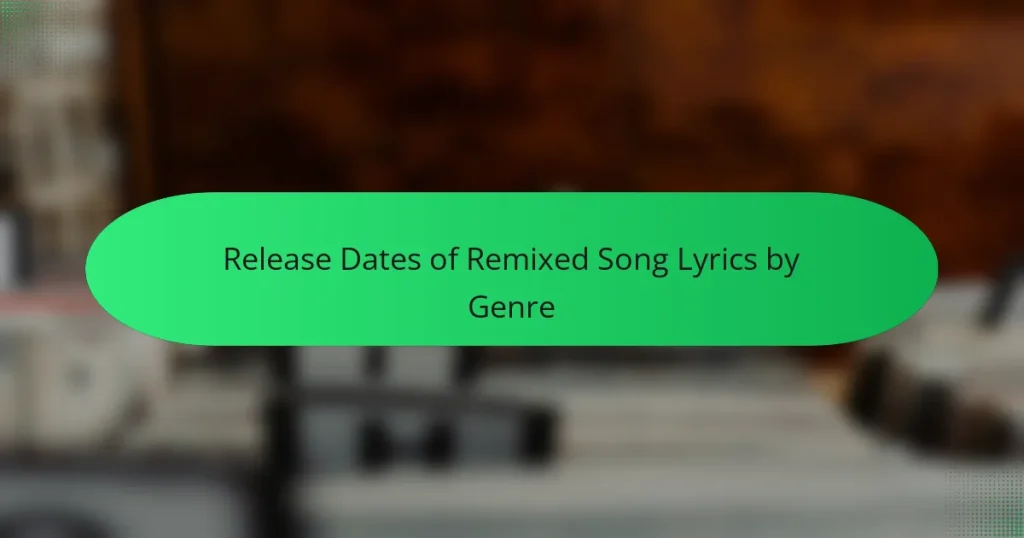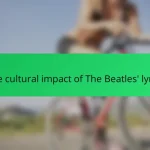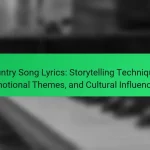The article examines the release dates of remixed song lyrics across various music genres, highlighting how these timelines differ significantly. In pop music, remixes typically debut shortly after the original track, while electronic dance music (EDM) often sees simultaneous releases. Hip-hop remixes may follow weeks to months later, aligning with promotional efforts, whereas rock remixes generally appear several months post-release, sometimes as part of anniversary editions. Country music remixes are less common and may emerge years after the original. This overview reflects the industry trends and promotional strategies that influence remix release schedules by genre.

What are the Release Dates of Remixed Song Lyrics by Genre?
The release dates of remixed song lyrics vary by genre. For pop music, remixes often release shortly after the original track, typically within a few months. In electronic dance music (EDM), remixes can be released simultaneously with the original song. Hip-hop remixes may appear weeks to months later, often coinciding with promotional campaigns. Rock genre remixes usually emerge several months post the original, sometimes as part of anniversary editions. Country music remixes may be less frequent, often released years after the original. These timelines reflect industry trends and promotional strategies across genres.
How do different genres influence the release dates of remixed song lyrics?
Different genres influence the release dates of remixed song lyrics through varying market demands and audience engagement strategies. Pop and electronic genres often see remixes released shortly after the original song to capitalize on current popularity. In contrast, genres like rock or jazz may have longer intervals for remixes, allowing for artistic reinterpretation.
Additionally, hip-hop frequently utilizes remixes as a promotional tool, leading to quicker release cycles. Historical trends show that EDM remixes typically follow original tracks within weeks to maintain momentum on streaming platforms. This pattern reflects the genre’s reliance on club culture and DJ sets.
Conversely, country music remixes may be released later to align with seasonal events or radio play schedules. The timing of remixes is thus intricately tied to the genre’s specific audience behaviors and marketing strategies.
What are the most common genres for remixed song lyrics?
The most common genres for remixed song lyrics include electronic, hip-hop, pop, and dance. Electronic music often features remixes that enhance beats and synths. Hip-hop remixes frequently incorporate new verses or beats. Pop songs are commonly remixed for radio play and club use. Dance music remixes are popular for their energetic appeal. These genres dominate the remix landscape due to their widespread popularity and adaptability.
How does genre popularity affect remix release timing?
Genre popularity significantly influences remix release timing. Popular genres often see remixes released shortly after the original track. This strategy capitalizes on the heightened listener interest and engagement. For instance, a song in a trending genre like pop may have a remix released within weeks of the original. Conversely, less popular genres might experience delays in remix releases. This is because the demand for remixes is lower, leading to a longer wait for producers to gauge interest. Historical data shows that remixes in popular genres chart higher and gain traction faster. Therefore, the timing of a remix release is closely aligned with the current popularity of its genre.
Why are release dates significant in the context of remixed song lyrics?
Release dates are significant in the context of remixed song lyrics because they influence cultural relevance and audience reception. A remixed song’s release date can align with trends or events, impacting its popularity. For example, a remix released during a summer festival can capitalize on heightened listener engagement. Additionally, the timing of a remix can affect its chart performance. Studies show that songs released during peak listening times often achieve higher rankings. Therefore, the release date plays a crucial role in a remix’s success and longevity in the music industry.
What role do release dates play in a song’s success?
Release dates significantly influence a song’s success. The timing of a release can affect its exposure and chart performance. For instance, songs released during holiday seasons often see increased sales and streaming. A strategic release date can align with events, trends, or other popular media. Research shows that songs released on Fridays typically perform better due to weekend listening habits. Additionally, releasing a song alongside promotional events can boost visibility. Historical data indicates that many chart-topping hits coincide with well-timed releases. Thus, the role of release dates is crucial in maximizing a song’s potential for success.
How can timing impact audience reception of remixed lyrics?
Timing significantly impacts audience reception of remixed lyrics. The timing of a remix’s release can align with cultural events or trends, enhancing its relevance. For example, a remix released during a holiday may resonate more with listeners. Additionally, the timing related to the original song’s popularity can influence reception. If a remix is released shortly after the original, it may capitalize on existing buzz. Conversely, a delayed release might lead to diminished interest. Research shows that timely remixes can achieve higher streaming numbers and social media engagement. This correlation highlights the importance of strategic timing in the music industry.
What trends can be observed in the release dates of remixed song lyrics?
Remixed song lyrics tend to be released shortly after the original tracks. This trend reflects the desire to capitalize on the original song’s popularity. Many remixes are launched within weeks or months of the original release. This timing is often driven by market demand and promotional strategies. Additionally, peak release periods align with major music festivals or events. This pattern enhances visibility and listener engagement. Data indicates that summer months often see a spike in remixed releases. This aligns with increased listener activity during the warmer season.
Which genres have the most notable trends in remix release dates?
Electronic dance music (EDM) and hip-hop have the most notable trends in remix release dates. EDM remixes often coincide with festival seasons, typically released in the spring and summer months. Hip-hop remixes frequently emerge around album anniversaries or major cultural events. According to a study by the International Music Summit, EDM saw a 40% increase in remixes during summer festival peaks. In contrast, hip-hop remixes often spike in late summer and early fall, aligning with back-to-school promotions. These patterns highlight the strategic timing of remix releases within these genres.
How have remix release patterns changed over the years?
Remix release patterns have evolved significantly over the years. In the past, remixes were often released as B-sides or exclusive tracks on physical formats. The rise of digital distribution has shifted this practice. Now, remixes are frequently released simultaneously with original tracks or shortly after. This change has been driven by streaming platforms that favor immediate access to music. Additionally, social media has enabled artists to promote remixes more effectively. The trend of remix competitions has also emerged, encouraging fan engagement. Overall, the accessibility and speed of digital platforms have transformed how remixes are produced and released.
How are remixed song lyrics released across different platforms?
Remixed song lyrics are released across different platforms through various digital distribution channels. These channels include streaming services, social media, and music download sites. Major platforms like Spotify and Apple Music often feature remixed tracks alongside original versions. Lyrics are sometimes provided directly on these platforms or through linked lyric websites. Social media platforms enable artists to share remixed songs and their lyrics for wider reach. Additionally, music blogs and forums may publish articles discussing new remixes and their lyrics. This multi-channel approach maximizes audience engagement and accessibility.
What platforms are most popular for releasing remixed song lyrics?
SoundCloud, YouTube, and Instagram are the most popular platforms for releasing remixed song lyrics. SoundCloud allows artists to upload and share their music, including remixes. YouTube provides a visual medium for remixed lyrics, often paired with music videos. Instagram enables artists to engage with fans through short clips and posts showcasing remixes. These platforms collectively support a vibrant community of remix artists and listeners. Their popularity is evident in the large number of users and the volume of content shared.
How do platform differences affect release dates?
Platform differences significantly affect release dates due to varying approval processes and distribution methods. Each platform, such as Spotify, Apple Music, or YouTube, has its own timeline for content review and publication. For instance, some platforms may require extensive quality checks before a song is released. This can lead to delays in availability compared to others that have quicker turnarounds. Additionally, licensing agreements may differ across platforms, impacting when a remixed song can be legally released. Historical data shows that songs released on platforms with faster processes often reach audiences sooner, highlighting the importance of platform selection in release strategies.
What are the best practices for timing the release of remixed song lyrics?
The best practices for timing the release of remixed song lyrics involve strategic planning around audience engagement and genre trends. Releasing remixes during peak streaming times, typically weekends, can maximize listener engagement. Aligning releases with significant events or holidays related to the genre can also enhance visibility.
Monitoring social media trends helps identify when audiences are most active. Collaborating with influencers or artists for simultaneous releases can amplify reach. Additionally, analyzing historical data on previous remix releases can inform optimal timing. For example, tracks released during summer months often perform better in pop genres.
The main entity of this article is the release dates of remixed song lyrics categorized by genre. The article examines how different genres, including pop, electronic, hip-hop, rock, and country, influence the timing of remix releases based on market demand and promotional strategies. It highlights trends in remix release patterns, the significance of release dates for cultural relevance and audience reception, and the impact of various platforms on the timing of releases. Additionally, best practices for optimizing the timing of remixed song lyrics are discussed, emphasizing strategic planning around audience engagement and genre-specific trends.


